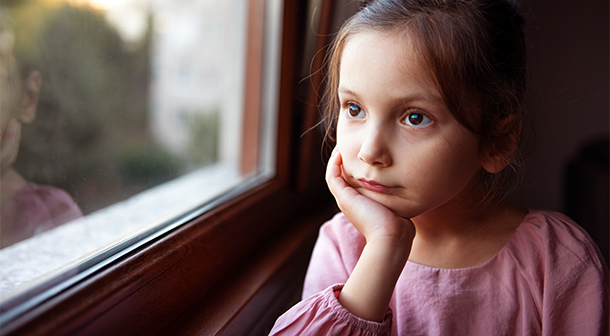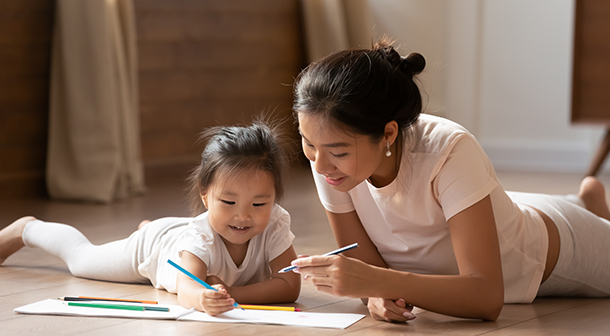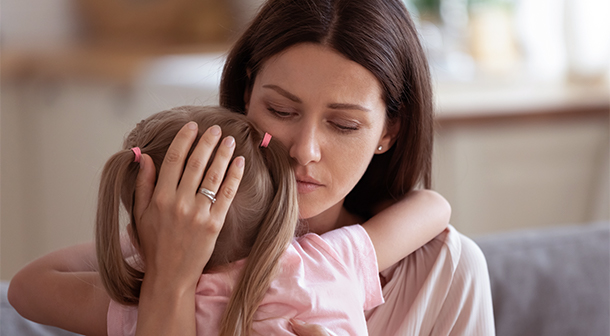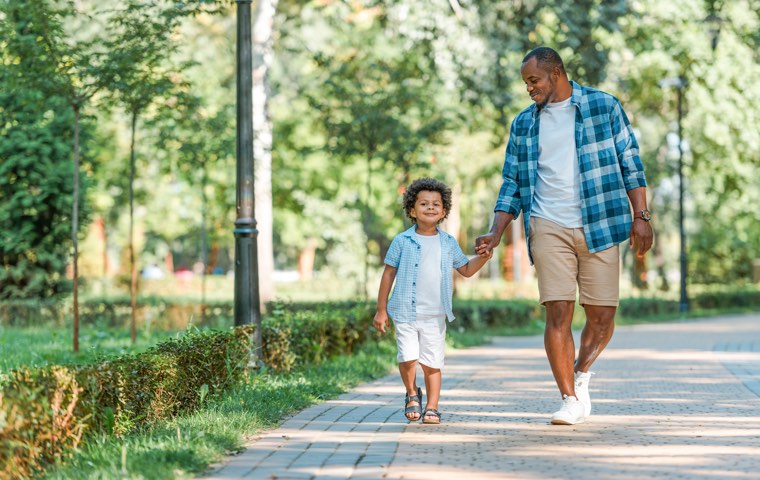Children experience loss and grief in many, different ways. Some may be affected more than others by common losses such as changing schools or having a friend move away. Other losses, like losing a parent, are much more significant. No matter the depth of the loss, each child processes loss in unique ways. And, how children process grief can have an impact on the people around them and on their daily lives. As parents or caregivers, we can find it difficult to know how a child is grieving and respond appropriately. Since grief looks different for each child, it may be hard to tell what they're feeling after a loss.

In October 2017, my children experienced unimaginable loss when their dad, my husband, passed suddenly from a heart attack. My children were only two and four years old at the time, and each of them reacted differently to the news of his passing. Even today, several years later, each one is processing their dad's loss differently. I have had to learn how to recognize each of their unique expressions of grief and how to respond to each of them. Here are five ways you can help a child deal with grief.
1. Be open and honest
Often, adults avoid or downplay a child's grief. Some adults believe they are protecting children by shielding them from grief. This can do more harm than good.
Adults should explain the loss in simple, direct terms that are appropriate for each child's age, experiences, and viewpoint. For example, when I told my children that their dad had died, I used language they understood, such as, “Daddy went to live with Jesus in heaven.” You may have to explain the loss many times, especially to younger children who have a more limited understanding of the loss.
Allow your children to ask questions at their own pace. It may take days, weeks, months, even years, for children to be ready to talk about it. Answer their questions as simply and honestly as you can. If you're in a situation where the topic comes up and you can't address it at that time, make sure each child understands that you will discuss it with them at the right time and place. But, be sure to follow up on the conversation as soon as you can. And remember, it's okay to admit if you don't have all the answers. You can say something like, “I don't know if anyone knows the answer to that, but this is what I believe.”
2. Recognize the signs of grief
Children will respond to news of a loss in vastly different ways. Some children, especially young ones, may want to play or participate in their normal activities. That's okay. It doesn't mean they don't have feelings or are being disrespectful. They simply cannot process their grief in that moment. Children will grieve differently than their parents and siblings. Some will want to talk about the loss, while others will want to avoid it. Some kids will want to play, while others may withdraw from activities. Younger children may become clingy or fearful, while teens may isolate themselves or only want to spend time with their peers. Respecting these different grieving styles is important in how you relate to grieving children.

Younger children may show grief by:
- Looking for the person they lost.
- Being irritable or crying more.
- Being clingy, wanting to be held more.
- Being less active, quiet, or less responsive.
- Losing weight.
- Being jumpy, anxious
- Being fretful, distressed.
- Having a hard time getting to sleep or having dreams or nightmares.
- Experiencing eating or toilet problems.
Older children may show grief by:
- Being anxious about their safety or the safety of loved ones.
- Showing stronger emotional reactions, such as anger, guilt, sadness, or sense of rejection.
- Trying hard to please adults.
- Feeling different from their peers.
- Concealing or feeling embarrassed about their loss.
- Becoming hyper-focused on the loss and talking about it often.
- Having a hard time getting to sleep or having dreams or nightmares.
- Changing their eating habits.
- Having trouble in school.
- Becoming defiant, irritable, or showing aggressive behavior.
- Complaining about stomachaches, headaches, or other physical ailments.
- Wanting to be closer to loved ones.
- Withdrawing from socializing (self-isolation).
- Experiencing depression.
- Having suicidal thoughts.
Understand that children will grieve at their own pace. My daughter and I grieved together after the death of my husband, her father. Although she was only four when he died, she had a better understanding of the permanence of his loss. We were able to grieve on a similar timeline. However, my son was only two when his daddy died and he couldn't comprehend the loss. Now, almost three years later, I am starting to recognize signs of grief in him. It's almost as though he has begun the grieving process only now that he can more fully understand what the loss means.
Need parenting help now?
The Texas Parent Helpline is available 24/7.
- Call 833-680-0611
- Chat with us
- Text 833-680-0611
3. Talk about the person they've lost
You may feel the urge to avoid talking about the person who died because you don't want to upset your child. This is common. However, it's far better to let children talk about and remember their loved one as often as they need to. Listen when they talk about their lost loved one and acknowledge their feelings as they bring them up. Don't be afraid to ask questions about their loved one, such as:
- What was your favorite thing to do together?
- What will you miss the most?
- How do you like to remember him?
Be patient with your children as they share their thoughts and feelings about grief. It may be hard for some kids to talk openly about their feelings. It may also be difficult for children to adequately express the emotions they are experiencing. Listen patiently and gently guide them if they need help expressing themselves.

You can also help children remember their loved ones through activities or special items. For instance, they may want to create a scrapbook of their loved one. An older child may want to write a story or a play about the loss. For my children, since they were so young, I had teddy bears made from my late husband's button-down shirts. I also ordered a special photo book for each of my children filled with photos of them and their dad. My kids would look at their photo books every night, and they still sleep with their “Daddy Bears” each night.
Children, especially young children, learn through stories. There are many excellent books about grief that children of all ages can benefit from. For young children, you can read the following books together:
- The Invisible String by Patrice Karst
- The Memory Box: A Book About Grief by Joanna Rowland
- God Gave Us Heaven by Lisa T. Bergren
- I Miss You: A First Look at Death by Pat Thomas
For older kids, these may be good options:
- I Wasn't Ready to Say Goodbye: Surviving Coping and Healing After the Sudden Death of a Loved One by Brook Noel
- Grief Day by Day: Simple Practices and Daily Guidance for Living with Loss by Jan Warner
- I Would But My Damn Mind Won't Let Me: A Teen's Guide to Controlling Their Thoughts and Feelings by Jacqui Letran
4. Keep your routine as consistent as possible
Kids thrive on structure. Grieving children need the comfort of structure when it feels as though their world has turned upside down. Try to keep daily, weekly, and monthly schedules as normal as possible.

Some things will never be the same after the loss. In these circumstances, try to create new rituals and family traditions. After my husband passed, I couldn't bear to take my kids to our traditional family vacation spot. So, I found a new place for us to go every summer. We started creating new family memories in a new place, but we still talk about how their dad would love our new vacation spot.
Also, it's important to maintain clear expectations. Kids who are grieving may act out in different ways. Defiance, aggression, and anger are common ways a child may show grief. While it's always good to acknowledge and try to understand that misbehavior is a reaction to grief, it still does not excuse it. Make sure each child understands that you still hold them responsible to act appropriately. Also, be willing to follow through with whatever discipline you would normally enforce if a child exhibits unacceptable behavior.
5. Find support for grieving children
Finally, do your best to find support for grieving children. Sometimes, kids can feel as though they can't speak to those close to them about their grief. Perhaps they're embarrassed. Perhaps they feel talking about their grief will make your grief worse. Make sure you find an outlet for your children to feel free to express their grief.
There are a couple of ways you can find grief support for children. The first is grief support groups. There are grief and bereavement centers across the nation that offer affordable (and sometimes free) group counseling for children. Or you can try grief therapy. Individual therapy by a licensed grief counselor is another way you can help a grieving child. This is especially helpful if a child is becoming depressed or showing signs of regression and needs individual care.

Don't forget to care for yourself
Often when your child or children are grieving, you are grieving as well. Don't forget to take care of yourself and attend to your own grief. Find grief support groups or a counselor you can open up to so that you can better process your own grief. This will not only help you heal, but your healing will help your children in their grieving process as well.
Grieving is not an easy or quick process. It may take months, years, or several years for children to work through their grief. Remember not to put a time limit on the grieving process. Practice patience and grace as you guide children through their grief at their own pace and in their own way.

Never feel ashamed or embarrassed to reach out for help. If you feel you need support or your child needs additional support, contact a trusted friend, your church, a grief support group, or your child's physician. You are not in this alone, and people want to help you and your child navigate this painful process.
Above all, remember that children are resilient. By providing them the support they need to cope, you are helping to ensure that they will begin to heal and, ultimately, find strength and hope on the other side.





